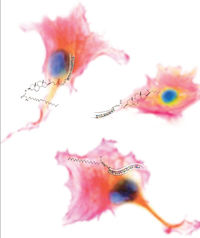Instituto de Medicina Molecular, Cenix BioScience, and Alnylam Pharmaceuticals discover new pathway for malaria infection
New research using RNAi technologies published on the first molecular link between malaria and the host cholesterol uptake pathway
Advertisement
Cenix BioScience GmbH, Alnylam Pharmaceuticals, Inc. and the Lisbon-based biomedical research centre Instituto de Medicina Molecular (IMM) announced the publication of their collaborative study in Cell Host & Microbe, describing the discovery and in vivo validation of scavenger receptor BI (SR-BI), a major regulator of cholesterol uptake by the liver, as a critical host factor for malaria infection. The new research findings are the first to describe a molecular link between cholesterol metabolism and malaria infection, and the new data could lead to new approaches for the treatment of malaria including use of RNAi therapeutics.
The published report by Rodrigues, Hannus and Prudêncio et al. (Cell Host & Microbe vol. 4) describes the results of studies to investigate a decade-old hypothesis that lipoprotein clearance pathways in the human host may somehow impact the infection of liver cells by malaria-causing Plasmodium parasites. In the study, the liver-expressed gene, SR-BI, was identified as a critical host factor for the liver infection stage of malaria using a systematic RNAi screen of known lipoprotein pathway components in a cultured human cell-based infection assay. These finding were then confirmed in animal models of malaria infection using small interfering RNAs (siRNAs), the molecules that mediate RNAi, specific for SR-BI silencing. SR-BI is well-known as the major liver receptor for high density lipoproteins (HDL), where it plays a key role in the transfer of cholesterol from the bloodstream to hepatocytes. In addition to studies using RNAi-mediated gene silencing, the pathophysiological relevance of SR-BI’s requirement for malaria infection was confirmed by a comprehensive series of experiments using synthetic small molecule inhibitor compounds, blocking monoclonal antibodies, SR-BI over-expression with transgenic mice, and SR-BI loss of function with knock-out mice. As such, this study establishes the first clear molecular link between malaria infection and cholesterol uptake pathways, thus describing a new therapeutic strategy in the fight against this devastating parasitic disease.
The current work results from an ongoing malaria research program started by the IMM group and their collaboration with Cenix, announced in 2005 to apply high-throughput RNAi technologies for discovery of host factor genes involved in malaria infection. This work was extended to include Alnylam’s technologies for in vivo delivery of siRNAs.
Other news from the department science
Most read news
More news from our other portals
See the theme worlds for related content
Topic world Antibodies
Antibodies are specialized molecules of our immune system that can specifically recognize and neutralize pathogens or foreign substances. Antibody research in biotech and pharma has recognized this natural defense potential and is working intensively to make it therapeutically useful. From monoclonal antibodies used against cancer or autoimmune diseases to antibody-drug conjugates that specifically transport drugs to disease cells - the possibilities are enormous

Topic world Antibodies
Antibodies are specialized molecules of our immune system that can specifically recognize and neutralize pathogens or foreign substances. Antibody research in biotech and pharma has recognized this natural defense potential and is working intensively to make it therapeutically useful. From monoclonal antibodies used against cancer or autoimmune diseases to antibody-drug conjugates that specifically transport drugs to disease cells - the possibilities are enormous



























































